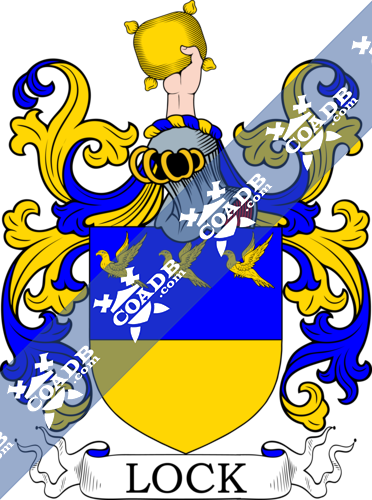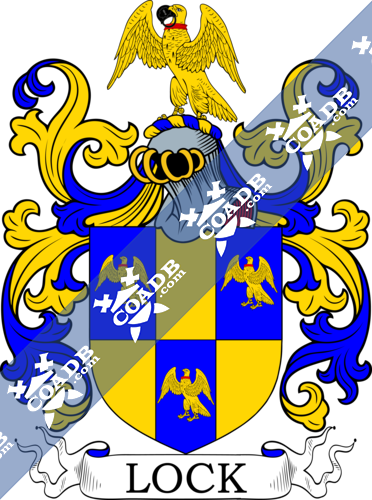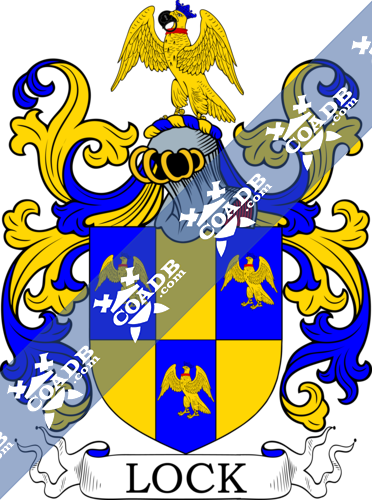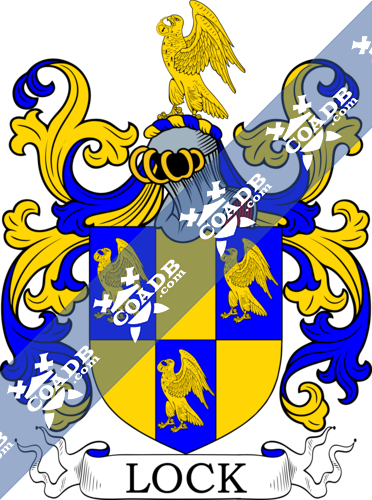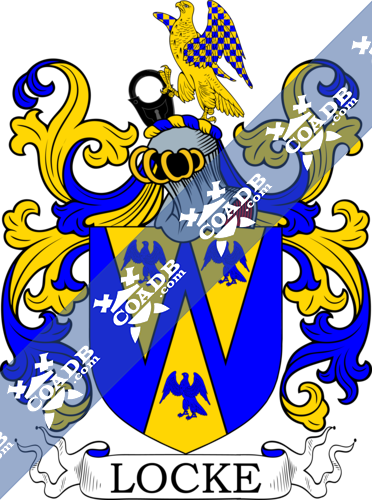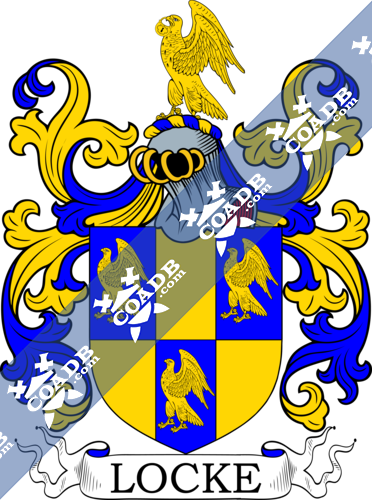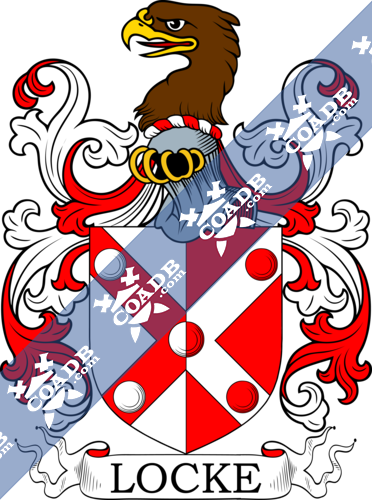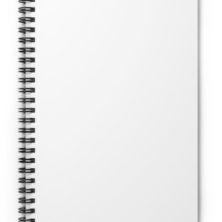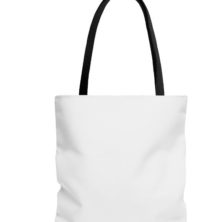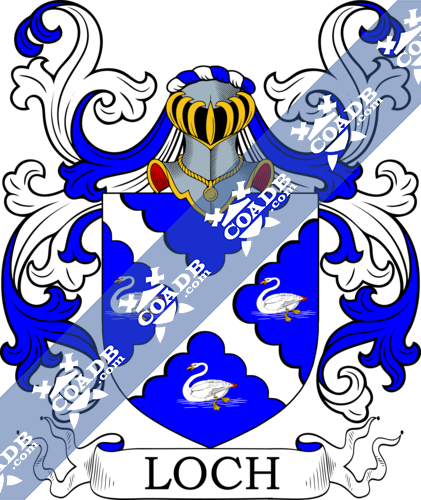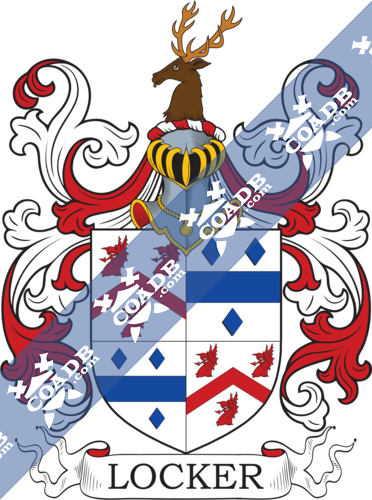Lock Family Crest, Coat of Arms and Name History
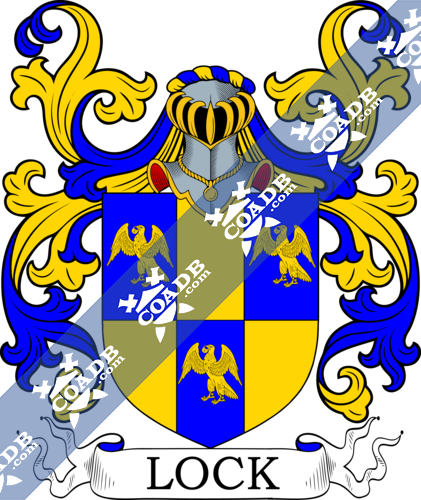
Lock Coat of Arms Gallery
Don’t know which Coat of Arms is yours?
We can do a genealogical research. Find out the exact history of your family!
Learn MoreLock Origin:
England
Origins of Lock:
This interesting surname is of Anglo-Saxon origin and has three distinct possible sources. Firstly, it may be a metonymic occupational name for a locksmith, from the Olde English pre 7th Century “loc”, lock, fastening. The name may also be geographical from house near an enclosure, a place that could be locked, from the Middle English “loke”, a improvement of the Olde English “loca” The Middle English “loke” was used especially of a barrier on a river, which could be opened and closed at will, and, by extensions, of a bridge.
Variations:
More common variations are: Locke, Locky, Loack, Louck, Leock, Loock, Locko, Loeck, Wlock, Loick.
Scotland:
The surname Lock first appeared in Peeblesshire (Gaelic: Siorrachd nam Puballan), earlier district in South-central Scotland, in the present day Scottish Borders Council Area.
England:
The very first recording spelling of the family was shown to be that of Leuric Loc, dated 1130, in the “Pipe Rolls of Warwickshire”. It was during the reign of King Henry 1st, who was known as “The Lion of Justice” dated 1100-1135. Surname all over the country became a necessity with the introduction of personal taxation. It came to be known as Poll Tax in England. Surnames all over the country began to develop with unique and shocking spelling varieties of the original one.
Ireland:
Many of the people with surname Lock had moved to Ireland during the 17th century.
United States of America:
Individuals with the surname Lock landed in the United States in three different centuries respectively in 17th, 18th, and 19th. Some of the people with the name Lock who arrived in the United States in the 17th century included John Lock, who landed in Virginia in 1628. William Lock, who settled in New England in 1634. William Lock, who settled in Barbados in 1635. Tho Lock, who arrived in Virginia in 1635. William Lock, aged 21, landed in Barbados in 1635.
People with the surname Cripps who landed in the United States in the 18th century included Jarvis Lock, who arrived in Virginia in 1702. Richard Lock, who landed in Bermuda in 1743.
The following century saw much more Lock surnames arrive. Some of the people with the surname Lock who arrived in the United States in the 19th century included Maria Lock, who arrived in New York, NY in 1850. David Lock, who landed in New York, NY in 1850. Fritz Lock, who landed in New York, NY in 1850. Thomas Lock, aged 28, landed in New York in 1854. William H Lock, who arrived in Mississippi in 1876.
Canada:
The following century saw much more Lock surnames arrive. Some of the people with the surname Lock who arrived in the Canada in the 19th century included Francis Lock, who arrived in Halifax, Nova Scotia in 1749-1752.
Australia:
Some of the individuals with the surname Lock who landed in Australia in the 19th century included Daniel Lock “alias Thurston”, English prisoner from Isle of Ely, who moved aboard the “Ann” in August 1809, settling in New South Wales, Australia. John Lock “alias Thurston”, English criminal from Island of Ely, who shifted aboard the “Ann” in August 1809, settling in New South Wales, Australia. William Lock “alias Thurston”, English convict from Isle of Ely, who moved aboard the “Ann” in August 1809, settling in New South Wales, Australia. George Lock, English convict from Middlesex, who moved aboard the “Asia” in October 1824, settling in New South Wales, Australia. Matthew Lock, English prisoner from Middlesex, who moved aboard the “Albion” in September 1826, settling in New South Wales, Australia.
New-Zealand:
Some of the population with the surname Lock who arrived in New Zealand in the 19th century included Samuel Lock arrived in Auckland, New Zealand aboard the ship “Cashmere” in 1853. S. Lock arrived in Auckland, New Zealand aboard the ship “Cashmere” in 1853. Julia Lock arrived in Auckland, New Zealand aboard the ship “Bombay” in 1865. Joseph Lock arrived in Wellington, New Zealand aboard the ship “Schiehallion” in 1872. William Lock arrived in Auckland, New Zealand aboard the shi “Berar” in 1873.
Here is the population distribution of the last name Lock:
England 10,674; United States 8,318; Australia 3,760; South Africa 3,160; Malaysia 2,808; Germany 1,849; Canada 1,828; Peru 1,425; Cameroon 1,090; Wales 914.
Notable People:
Bob Lock (born 1949), is a Welsh science fiction and fantasy author.
Charles Lock (1770–1804), was a British consul-general in Naples who quarreled with Admiral Horatio Nelson regarding the latter’s military actions.
Blazons & Genealogy Notes
1) (London). Per fesse az. and or, in chief three falcons volant of the second. Crest—A hand ppr. holding up a cushion or.
2) (Warnford, co. Southampton; Thomas Lock, Esq., Clarenceux King of Arms, 1784; granted 1767). Per fesse az. and or, a pale counterchanged, on the first three falcons rising of the second, collared gu. Crest—A falcon, as in the arms, in the beak a padlock pendent sa.
3) (Mildenhall, co. Suffolk; granted 8 Dec. 1770). Same Arms, falcons ducally crowned az. Crest—A falcon rising or, ducally crowned ar. in the beak a padlock pendent sa.
4) (Norbury Park, co. Surrey). Per fesse az. and or, a pale and three falcons, two and one, with wings addorsed and belled, each holding in the beak a padlock all counterchanged. Crest—A falcon as in the arms.
5) (London; Sir William Lock, Knt., Alderman, Visit. London, 1563; his dau. Dorothy, m. Joun Cosworth, Esq., heir presumptive to his nephew, John Cosworth, Esq., of Cosworth, co. Cornwall). Per fess az. and or, a pale counterchanged, three falcons rising, each holding in their beaks a padlock of the second.
6) (Joseph Locke, Esq., of Lowndes Square, London, Lord of the Manor of Honiton). Motto—Mente non marte. Az. three piles, two issuing. from the chief and one from the base or, each charged with a falcon belled, rising, of the field. Crest—A falcon belled or, wings elevated chequy of the last and az. and resting the dexter claw upon a padlock sa.
7) (Ashton Gifford, co. Wilts, and Stourcliffe, co. Hants; granted 5 July, 2 Philip and Mary). Per fesse az. and or, a pale counterchanged, three hawks with wings endorsed of the last. Crest—A hawk with wings endorsed holding in the beak a padlock or.
8) (confirmed by St. George, Ulster, 1675, to Lieut. Richard Locke, J.P., co. Kildare, descended from the Lockes, of the Isle of Wight). Per pale ar. and gu. on a saltire five roundles all counterchanged. Crest—An eagle’s head ppr. beaked or.

